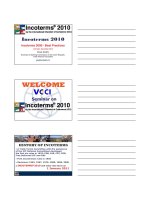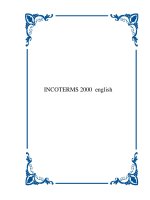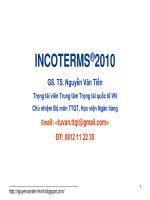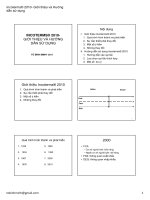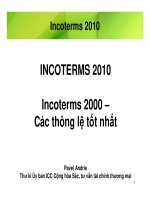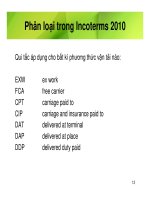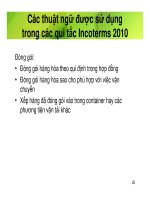Incoterms 2010 english
Bạn đang xem bản rút gọn của tài liệu. Xem và tải ngay bản đầy đủ của tài liệu tại đây (2.11 MB, 117 trang )
International Chamber of Commerce (ICC)
CONTENTS
Foreword ........................................................................................... 118
Introduction .......................................................................................119
INCOTERMS® 2010
Rules for any mode or modes of transport
EXW .................................................................................................. 129
FCA .................................................................................................................. 137
CPT .................................................................................................................. 147
CIP ....................................................................................................................150
DAT ...................................................................................................................167
DAP .................................................................................................... 175
D D P .................................................................................................... 183
Rules for sea and inland waterway transport
FAS ...................................................................................................................193
FOB ................................................................................................................... 201
C FR ...................................................................................................................209
CIF ..................................................................................................... 219
Incoterms® 2010
1 17
International Chamber of Commerce (ICC)
FOREWORD
By Rajat Gupía, ICC Chairman
The gỉobaỉ economy has given businesses broader access than ever before
to markets all over the world. Goods are sold in more countries, in larger
quantities, and in greater variety. But as the volume and complexity o f
global sales increase, so do possibilities for m isunderstandings and costly
disputes when sale contracts are not adequately drted.
The incoterms® ruỉes, the ICC rules on the use o f domestic and
intemationaỉ trade terms, facilitate the conduct o f ^lobal trade. Rerence
to an Incoterms® 2010 rule in a sale contract clearỉy deílnes the parties'
respective obligations and reduces the risk o f legal complications.
Since the creation o f the Incoterms rules by ICC in 1936, this globally
a c ce p ted c ontractual Standard has been regulariy u p d a te d to k e e p pace
with the developm ent o f I n t e r n a t i o n a l trade. The ỉncoteniìs® 2010 rules
take account o f the continued spread o f customs-free zones, the increased
use o f electronic Communications in business transactions, heightened
concem about security in the movement o f goođs and chanoes in transport
practices. ỉncoterm s-^ 2 0 Ì0 updates and consolidates the 'delivered’ rules,
reducing the tptai num ber o f rules íroni 13 to 1 K and offers a sim pler and
clearer presentation o f all the rules. Ịn co term sề 2010 is also the ílrst
version o f the Incoterms ruỉes to make all references to buyers and selỉers
gender-neutraỉ,
The broad expertise o f ICC's Commission on Com mercial Law and
Practice, whose membership is dravvn from all parts o f the world and all
trade seclors, ensures that the Incoterms® 2010 rules respond to busincss
needs everywhere.
ICC would like to express its gratitude to the members o f the
Com m ission, chaired by Fabio Bortolotti (Italy), to the Draftina Group,
which com prised Charles Debattista (Co-Chair, UK), Christoph Martin
Radtke (Co-Chair, Prance), Jens Bredow (Germany), iohnny Herre
(Sweden), Daviđ Lowe (ƯK), Lauri Railas (Pinland), Frank Reynolds
(US), and Miroslav Subert (Czech Republic), and to Asko Raty (Pinland)
for assỉstance with the images depicting the 1] rules.
18
Incoterms® 2010
International Chamber of Commerce ÍICC)
INTRODUCTION
The Incoterm s® ruỉes explain a set o f íhrce-ỉetter trade term s reílectine
business-to-business practice in contracts for thc sale o f soods. The
incoterms rules describe rnainly ihe tasks, costs and risks invoỉved in the
deliver> o f eoods from sellers to buvers.
How to use the Incoterms® 2010 rules
1. Incorporate the Incoterms® 2010 rules into your contract of
sale
ỉf you want the ỉncoíermsíg;' 2010 rules ro apply to vour contract, you
should make this clear in the contĩrict. throueh such \vords as. "[the
chosen Incoterms n iỉe incỉĩiding ỉhe named pỉace. /o ỉk n v e d by]
Incoterms® 2010".
2. Choose the appropriate Incoterms rule
The chosen Incoterms ruie needs to be appropriate to the soods, to thi,
means o f their transport, and above all to whether the parties intend to pui
additional obligalions, for example such as the obligation to organize
carriage or Insurance, on the seller or on the buyer. The G uidance Note to
each íncoterm s rule contains infomiation that is pailicularlv he!pful when
making this choice. W hichever íncoterms rule is chosen. the parties
should be aware that the ịníerpretation o f their contract may wel! be
innưenced by custom s particular to the port or place beiníi used.
3. Specity your place or port as precisety as possible
7'he chosen Incoterm s rule can vvork onìy ir the parties name a pỉace or
poit, and will \vork besl iĩltìe parlles speciỉy tlie place or porl as precisely
as possible.
A ^ood exam ple o fsu c h precision wouid be;
“ FC A 38 Cours Albert 1 er, Paris, Prancc Incerms® 2010”.
Under the Incoterm s rules Ex Works (EXW), Free Carrier (FCA),
Delivered at Terminal (DAT), Deỉivered at Place (DAP), Delivered Duty
Paid (DDP), Free Alongsỉde Ship (FAS), and Free on Board (FOB), the
named place is the place \vhere delivery takes place and where risk passes
from the seller to the buỵer. Under the ỉncoterms rules Carrìage Paid To
(CPT), Carriage and Insurance Paid To (CIP). Cost and Preight (CFR) and
Incoterms® 2010
119
Internatỉonaỉ Chamber of Commerce (ICC)
Cost, Insurance and Preight (CỈF), the named place diíĩers from the piace
o f delivery. Under these four ỉncoterm s ruỉes, the named place is the place
o f destination to vvhich carriage is paid. Indications as to place or
destination can helpfully be further specified by statiim a precise point in
that place or destination in order to avoid doubí or ar^ument.
4. Remember that InCoterms rules do not give you a complete
Contract of sale
Incoterms rules do say which party to the sale contract has the obligation
to make carriage or insurance arrangemenls, when the seỉler delivers the
goods to the biiyer, and which costs each party is responsibỉe for.
Incoterms rules, hovvever, say nothing about the price to be paid or the
method o f its payment. N either do they deal with the transíer o f
ONvnership o f the goods, or the consequences o f a breach o f contrací.
These matters are normaỉly dealí vviỉh throuuh express lerm s in the
contract o f sale or in the la\v governing that contract. The parties shouỉd
he aware that mandatory locaỊ law may override any aspect o f the sale
contract, including the chosen Incoteims rule.
IMain ĩcatures o f the Incoterms® 2010 ruies
1. Two new ỉnCoterms rules - DAT and DAP - have replaced the
Incoterms 2000 rules DAF, DES, DEQ and DDU
The number o f Incoterms rules has been reduced írom 13 to Ị 1. This has
been achieved by substituting two new rules that may be used irrespective
o f the agreed mode o f transport - DAT, Delivered at Terminaỉ, and DAY,
Delivered at Place - for the Incoterms 2000 ruỉes DAF, DES, DEQ and
DDU.
Under both nevv rules, delivery occurs at a named destination: in DAT, at
the buyer’s disposal unloaded from the arriviníì vehicle (as under the
tbĩTĩìer DEQ rule); in DAP lìkewise at the buyer's disposa!, bui ready tbr
unloadỉng (as under the former DAF, DES and DDU rules).
The nevv rules make the Incoterms 2000 rules DES and DEỌ supertluous.
The named terminal in DAT may well be in d pdrt, and DAT can therefore
safeỉy be useđ in cases v/hcic the Incoterms 2000 ruỉe DEQ once was.
Likevvise, m e a i T Ì v í n g “ v e h i c l e ” under DAP may w e l l b e a ship and the
named place o f destination may well be a port: consequently, DAY can
safelỵ be used in cases where the Incoterms 2000 rule DES once was.
These new rules, like their predecessors, are '‘deiivered”, with the seller
bearing all the costs (other than those related to import clearance, vvhere
appỉicable) and risks ínvolved in bringing the ^oods to the named place o f
destination.
120
Incotemns® 2010
International Chamber of Commercfi (ICC)
2. Classification of the 11 Incoterms® 2010 rules
The 11 ỉncolenns® 2010 rules are presented in t\vo distinct classes;
RULES FOR ANY MODE OR MODES 0 F TRANSPORT
EXW
EX WORKS
FCA
PREECARRIER
CPT
CARRIAGE PAID TO
CIP
CARRIAGE AND INSURANCE PAID TO
DAT
DELIVERED AT TERMINAL
DAP
DELIVERED AT PLACE
DDP
DELỈVERED DUTY PAID
R U LES FOR SEA AND INLAND VVATERVVAY TRAN SPO RT
FAS
FREE ALONGStDE SHIP
FOB
PR EEO N BOARD
CFR
C O STA N D PR EIG H T
CIF
COST INSURANCE AND PREIGHT
The íìrst class includes the seven ỉncoterms® 2010 ruỉes thai can be used
irrespective o f the mode of transport selecteđ and irrespective o f whether
one or more than one mode o f transport is employed. EXW, FCA, CPT,
CIP DAT, DAP and DDP belong lo this cỉass. 'íhey can be used even
when there is no maritime transport at aỉl. It is important to remember,
hovvever, that these rules can be used in cases \vhere a ship is used íbr
part o f the carriage.
In the second cíass o f Incoteims® 2010 ruies, the poịnt o f delivery and
the place to which the goods are carried to the buyer are both ports, hence
the label “sea and inỉand waterway" rules. FAS, í'OB, CFR and CiF
belong to this class. Under the !ast three incolcrms rules, al! mention of
the ship's raiỉ as the point o f delivety has been omiited in preíerence for
the goods being delivered when they are “on board” the vessel. This more
closely reílects modern commercia: reaỉity and avoids the rather dated
image o f the risk svvinging to and fro across an imaginary perpendicular
line.
lncotermsfS)2010
121
International Chamber of Commerce (ICC)
3. Rules fo r domestic and international trade
Incoterms ruỉes have tradiíionally been used in internaíionaỉ saỉe
contracts where goods pass across nationaỉ borders. In various areas o f
the vvorld, however, trade blocs, like the European Union, have made
border forma!ities between different countries ỉess siiíỉiiíícant.
Consequently, the subtitle o f the Incoterms® 2010 rules íorm ally
recognizes that they are available for application to both international and
domestic sale contracts. As a result, the Incoterms® 2010 rules clearly
State in a number o f places that the obligation to compỊv vvith export/
import forma!ities exists only where applicable.
Two deveỉopm ents have persuaded ICC that a movement in this direction
is timely. Pirstly, traders commonly use Incoterms rules for purel>
domestic sale contracts. The second reason is the ^reater vvillingness in
the United States to use Incoterms rules in domestic trade rather than the
former Uniform Commercial Code shipment and delivery terms.
4. Gdance Notes
Before each Incoterms® 2 0 ]0 rule you vviỉl flnd a G uidance Nole. The
Guidance Notes explain the ĩundamentals o f each Incoterms rule, such ds
when it should be used, when risk passes, and how costs are allocated
betvveen seiler and buyer. The Guidance Notes are not part o f the actua.
Incoteim s® 2010 rules, but are intended to help the user accurately and
eíTiciently steer towards the appropriate Incoterms rule for a paríiculai
transaction.
5. Electronic communication
Previous versions o f Incoterms rules have specified those documents that
could be replaced by EDI messages. Articles A I/B I o f the Incoternis®
2010 ruỉes, hovvever, now give electronic means o f com munication the
same eíTect as paper communication, as long as the parties so a»ree or
where customary. This formulation ĩacilitates the evolution o f new
electronic procedures ihroughout the liíetim e o f the Incoterms® 2010
rules.
6. Insurance cover
The Incoterms® 2010 rules are the fĩrst version o f the Incoterms rules
since the revision o f the Institute Cargo Clauses and take account oí'
alterations made to those clauses. The Incoterms® 2010 rules place
information duties relating to Insurance in articles A3/B3, which deal with
contracts o f carriage and insurance. These provisions have been moved
from the more generic articles found in articies AIO/BIO o f the Incoterms
2000 rules. The language in articles A3/B3 relating to Insurance has also
been aỉtered with a view to clarifying the parties’ obligations in this
regard.
122
Incoterms® 2010
International Chamber of Commerce (ICC)
7. Security-reỉated clearances and Jnform ation required fo r such
clearances
There is heightened concern novvadays aboưí .ecuDly in the movement of
goods. requiring verification thai the goods du noi pose a threat to !ife o r
property for reasons other than their inhercní nature. Therefore, the
Incoterms® 2010 rules have allocated oblií^at.ons between the buyer and
seỉler to obtain or to render assistance in obtaining security-relaled
cỉearances, such as chain-of-custody informaiion. in articles A2/B2 and
A 10 /B 10 o f various Incotenns ruies.
8. Terminal handling charges
U nder Incoterms rules CPT, C!P. CFR. CỈF. DAT, DAP and DDP, the
selỉer must make arranííements for the carria»e of the goods to the asreed
destination. While the freight is paid by the seỉỉer, it is actually paid for by
the buyer as freight costs are normaỉly included by the seMer in the totai
selling price. The carrỉage costs wilỊ sometimes include the costs of
h a n d lin g and m o v i n s the aoods within port or Container term in a l facilities
and the carrier or tenninal operator may \vell charge these costs to the
buyer who receives the goods. ín these circumstances, the buyer wili want
to avoid paying for the same Service t\vice: once to the seller as part o f the
total selling price and once independently to the carrier or the terminal
operator. The Incoterms® 2010 rules seek to avoid this happening by
clearly allocating such costs in articles A6 B6 of the relevant Incoterms
rules,
9. strin g sales
!n the sale o f commodities, as opposed to the saie ofm anufactured goods,
cargo is frequentỉy sold severaỉ times á u rìm trisit “down a string".
When this happens, a selier in the middỉe of ihe string does not "ship” the
goods because íhese havc already beeri shipped by the íìrst seller in the
string. The seller in the middle of the síring tliereíore performs ils
obligations tovvards its buyer not by shippinii the goods, biil by ''procuring”
^oods that have been shippeíl. For clarifìcation purposes, Ịncolerms(iC'
2010 rules include the obligation to “procure uoods shipped’' as an
alternative to the obligation to sliip goods in thc rclevant Incoterms rules.
Variants o f Incoterms ruỉes
Sometimes the parties want to alter an Ịncoterms rule. The Incotemis®
20 ỉ 0 rules do not prohibit such alteration, but íhcre are dangers in so
doing. In order to avoid any unvvelcome surpriscs. tlie parties woưld need
to make the intended eíĩect of such alteraiions extremely clear in their
contract. Thus, for example. if the allocaíion o f costs in the ỉncoterms®
2 0 1 0 r u ỉ e s is a ỉ t e r e d in t h e cont ra ct , the pa r ti e s s h o u l d a l s o c l e a r l y State
vvhether they intend to vary the point at \vhich the risk passes from seller
to buyer.
incoterms® 2010
123
International Chamber of Commerce (ICC)
Status o f this introduction
This introduction gives general inforrttạtion on the use and interprctation
o f the Incoterms® 2010 ruies, but does not fonn part o f those ruỉes.
Expỉanation o f terms used in the Incoterms® 2010 rules
As in the Incoterms 2000 rules, the seller^s and buyer’s obligations are
presented in mirror fashion, reílecting under column A the seller’s
obligations and unđer column B the buyer’s obligations. These
obligations can be carried out personally by the selỉer or the buyer or
sometimes, subject to terms in the contract or the applicable la\v, ihrouiíh
intermediaries such as carriers, íreight forwarders or other persons
nominated by the seller or the buyer for a speciíĩc purpose.
The texí o f the Incoterms® 2010 rules is meant to be self-explanatorv'.
However, in order to assist users the foỉỉowing text sets out ouidạnce as to
the sense in which seỉected terms are used throughout the document.
C a rrie r: For the purposes o f the Incerms® 2010 ruies. the carrier is the
party with whom carriage is contracted.
C ustom s form alities: These are requirements to be met in order to
comply vvith any appỉicable customs regulations and may include
documentary, security, information or physicaỉ inspecrion obligations.
D elivery: This concept has multiple meanings in trade Ịaw and practice,
but in the ỉncoterms® 20 ỉ 0 rules, it is used to indicate where the risk oi'
loss o f or damage to the goods passes from the seller to the buyer.
Deỉivery document; This phrase is now used as the heading to ariicle A8.
It means a document used to prove that delivery has occurred. For manỵ
o f the Incoterms® 2010 rules, the delivery document is a transporí
đocument or corresponding eỉectronic record. Hovvever, vvith EXW, FCA,
FAS and FOB, the delivery docum ent may simpiy be a receipt. A deliveiy
document may also have other functions, for example as part o f Ihe
mechanism for payment.
Electronic record o r p ro ced u re: A set o f inĩormation constituted o f one
ờr more electronic messages and, where applicable, being íunctionally
equivalent with the corresponding paper document.
P ackagỉng: This word is used ío rd iíĩeren t purposes;
124
1.
The packaging o f the goods to comply vvith any requirem ents
under the contract o f sale.
2.
The packaging o f the goods so that they are fit for transportation
Incoterms® 2010
Internationa! Chamber of Commerce (ICC)
3. The stowage of the packaged goods vvithin a C ontainer or other
means o f transport.
In the ỉncoterm s® 20 ì 0 rules, packaging means both the fírst and second
o f the above. The Incoterms® 2010 rules do not deal with the parties’
o b lig a tio n s for stovvage w ịthịn a Container and th erefore, w h e re relevant,
the parties shouỉd deal with this in the sale contract.
ỉncoterms® 2010
125
.'i
ỡ ^ l^m m erce (ICC)
ô
:j
r
126
ncotermsđ 2010
Internonal Chamber of Cornmerce (ICC)
RULES PORANY
MODE OR
MODES OF
TRANSPORT
Incoterms® 2010
127
International Chamber of Commerce (ICC)
t
128
Incotenms® 2010
International Chamber of Cofnmeo:e (ICC)
EXW
EX VVORKS
EXW (insert named place o f delivery) Incoterms® 2010
OEUVERY
G UIDANCE NOTE
This rule may be used irrespective o f the mode o f fransport selected and
may also be used where more than one mode o f transport is employed. It
is suitable for domestic trade, while FCA is usualiy more appropriate for
intemational trade.
“Ex Works” means that the seUer delivers when it places the goods at the
disposaỉ o f the buyer at the seller’s premises or at another named place
(i.e., works, factory, warehouse, etc.)- The seỉler does not need to load the
goods on any collecting vehicle, nor does it need to clear the goods for
export, where such clearance is applicable.
The parties are well ađvised to speciíy as ciearly as possible the point
within the named place of delivery, as the costs and risks to that point are
for the account o f the seller. The buyer bears all costs and risks involved
in taking the goods from the agreed point, if any, at the named place o f
delivery.
EXW represenls the minimum obỉigation for the seỉler. The rule should be
used with care as;
a) The seller has no obligation to the buyer to load the goods, even though
in practice the seller may be in a better position to do so. If the seller
does toad the goods, it does so at the buyer’s risk íinđ expense. In cases
w here the seller is in a better position to load the goods, FCA, vvhich
obliges the seller to do so at iís own risk and expense, is usually more
appropriate.
b) A buyer who buys from a selỉer on an EXW basis for export needs to
be aware that the seller has an obligation to provide only such
assistance as the buyer may require to effect that export: the seller is
not bound to organize the export clearance. Buyers are therefore weỉ!
advised not to use EXW if they cannot directly or indirectiy obtain
export clearance.
c) The buyer has Hmited obligations to provide to the seller any
inĩoĩmation regarding the export o f the goods. Hovvever, the seller may
need this iníormation for, e.g., taxation or reporting purposes.
Incotenrris® 2010
129
íntematỉonal Chamber of Commerce ỢCC)
A THE SELLER’S OBUGATIONS
AI
General obllgatỉons o f the seller
The seller must provide the goods and the commercial invoice in
coníormity with the contract o f sale and any oứier evidence o f
coníormity ứiat may be required by ứ>e conưact.
Any document reíerred to in Al -Al O may be an equivalent
electronic recorđ ot procedure if agreed between the parties or
customary.
A2
Ltcences, authorỉzatlons, security clearances and o ơier
torm alltíes
Where applicable, ứie selỉer must provide the buyer, at ửie buyer’s
request, risk and expense, assistance in obtaining any export licence,
or otìier oữĩciai auứiorization necessary for ứie export o f the goods.
Where appltcable, the seller must provide, at the buyer’s request,
nẹk and expense, any iníormaíion in the possession o f ứie selỉer that
is required for the security clearance o f the goods.
A3
Contracts o f cầrriage and Insurance
a) Contract o f carríage
The seller has no obligation to the buyer to make a coiĩứ^ct o f
carriage.
b) Contract o f ừisurance
The selier has no ỡbiigation to the buyer to make a cOTtract o f
Insurance. However, the sellcr must provide ứie buyer, at the buyer’s
request, risk and expense ( if any), with informatron that the buyẹr
needs for obtaining ùisurance.
A4
Delivery
The seller must deliver the goods by placing them at the disposal o f
the buyer at the agreed point, if any, at tíie named place o f delivery,
not loaded on any collecting vehicle. If no specific point-has been
agreed vvithin the named place o f delivery and if there are several
points available, the seller may select the point that best suits its
puq>ose. The seller must deliver the goods on ứìe agreed date or
within the agreed periođ.
130
lncotenrĩìsíg)2010
International Chamber of Commerce (ICC)
BTHE BUYER’S OBLIGATỈONS
B1
General obligatlons o f the buyer
The buyer must pay the price of the goods as provided in the
contract o f sale.
Any document referred to in Bl-BlO mav be an equivalent
elecừonic record or procedure if agreed betvveen the parties or
customary.
B2
Licences, authorizations, security clearances and other
formaỉitỉes
Where applicabỉe, it is up to the buyer to obtain, at its own risk and
expense, any export and import ỉicence or other oíTicial
authorization and carry out all customs formalities for the export o f
the goods.
B3
Contracts o f carrỉage and Insurance
a) Contract o f carriage
The buyer has no obligation to the seller to make a contract o f
caưiage.
b) Contract o f Insurance
The buyer has no obligation to the seller to make a contract o f
Insurance.
B4
Taking delivery
The buyer must take delivery o f the goods when A4 and A7 have
been compỉied with.
Incoterưis® 2010
131
Internátianal Cham‘Der of Commerce (ICC)
A5
Transfer o f risks
The selỉer bears all risks o f loss o f or damage to the goods unti! they
have been deliveređ in accordance wiứi A4 with the exceptian o f
loss-or damage in the circumstances described in B5.
A6
Allocation of costs
The seller must pay all costs relating to the goods until they have
been delivered in accordance with A4, other than those payable by
the buyer as envisaged in B6.
A7
Notices to the buyer
The seller must give the buyer any notice needed to enable ứie buyer
to take delivery o f the goods.
A8 Delivery document
The seller has no obỉigation to the buyer.
132
Incolerms® 2010
International Chamber of Commerce (ICC'
B6
Transíer o f rỉsks
The buyer bears all risks o f ỉoss of or damage to the goods from the
time they have been delivered as envisaged in A4.
If the buyer faiỉs to give notice in accordance with B7, then the
buyer bears all riskĩ’ o f Ịoss o f or damage to the goods from the
agreed date or the expiry date o f the agreed period for deliver
provided that the %oốs have been clearly identified as the contract
goods.
B6
Allocatìon o f costs
The buyer must:
a) pay aỉl c jsts relating to the goods from the time they have been
delivered hs envisaged in A4;
b) pay any additionaỉ costs incurred by failing either to take deliveiy
o f the goods when they have been placed at its disposal or to give
apprcpriate notice in accordance with B7, provided that the gaods
have been clearly identified as ứie contract goods;
c> pay, vvhere applicable, all duties, taxes and other charges, as well
ÍS the costs o f carrying out customs íormalities payable upon
export; and
d) reimburse all costs and charges incurred by the seller in providing
assistance as envisaged in A2.
Đ7
Notices to the seller
The buyer must, whenever it is enlitled to determine the tim e within
an agreed period and/or the point o f taking deỉivety within the
named pỉace, give the seller suíTicient notice thereoí.
B8
Prooí o f delivery
The buyer must provide the seỉler with appropriate evidence o f
having taken delivery.
Incoterms® 2010
133
‘International Chamber of Commerce (ICC)
A9
Checking -packaging -m arking
The seiler must pay the costs o f those checking operations (such as
checking quality, measuring, vveighing, counting) that are necessary
for the puq^ose o f delivering the goods in accordance with A4.
The seller must, at its own expense, package the goods, unless it is
usual for the particular trade to transport the type o f goods sold
unpackaged. The seỉler may package the goods in the manner
appropriate for their transport, unless the buyer has notiĩied the
seller o f specific packaging requirements befcre the contract o f saỉe
is concluded. Packaging is to he marked appropriately.
A10 Asslstance with inforniation and related costs
The seller must, where appỉicable, in a timely manner, provide to or
render assistance in obtaining for the buyer, at the buyer’s request,
risk and expense, anỳ documents and iníormation, including
security-related information, that the buyer needs for the export and/
or import o f the goods and/or for their transport to the final
destination.
134
Incoterms® 2010
International Chamber of Commerce (iCC)
Đ9
tnspectlon o f goods
The buyer must pay the costs o f any mandatory pre-shipment
inspection, including inspection mandated by the authorities o f the
countiy o f export.
Đ10 Asslstance w ith ìnfonmation and related costs
The buyer must, in a timely manner, advise the seller o f any security
information requirements so that the seỉler may comply with AIO.
The buyer must reimburse the selỉer for a|Ị costs and c h ^ e s
incurred by the seller in providing or rendering assistance in
obtaining documents and inĩormation as envisaged in AIO.
Incoterms® 2010
135
International Chamber of Commerce (ICC)
ỉt
i.
:_ o
136
Incotenn9(g>2010
International Chamber of Commerce (ICC)
FCA
Free Carrier
FCA (insert named place o f deiivery) Incoterms® 2010
O C LlV eR Y
i
G ƯIDANCE NOTE
This rule mầy be used iưespective o f the mode o f transport selected and
may aỉso be used where more than one mode o f transport is employed.
“Free Carrier” means that the seller delivers the goods to the carrier or
another person nominated by the buyer at the seller’s premises or another
named place. The parties are weil advised to speciíy as clearly as possible
the point within the nsimed place o f đelivery as the risk passes to the
buyer at that point.
If the parties intend to deliver the goods at the selỉer’s premises, they
shouid ìdentiíy the address o f ứiose premises as ứie named place o f
deỉivery. If, on the other hand, the parties intend the goods to be delivered
at another place, they must identiíy a dìfFerent specific place o f đelivery
FCA requires the selier to clear the goods for export, where applicable.
However, the seller has no obligation to clear the goods for import, pay
any ỉmport đuty or carry out any import customs íormalities.
Incoterms® 2010
137
International Chamber of Commerce (ICC)
A THE SELLER’S OBLIGATIONS
AI
General oblỉgations o f the seUer
The seller must provide ửie goods and the commercial invoice in
conformity with the contract o f saĩe and any other evidence o f
conformity that may he required by the contract.
Any document reĩeired to in AI-AIO may be an ẽquivalent
eỉectronic record or procedure if agreeđ between the pãrties or
customary.
A2
Lỉcences, authorizations, securíty clearances and o th e r
formalítỉes
Where applicable, the seller must obtain, at its own .risk and
expense, any export licence or other oữĩciaỉ authorization and carry
out all customs íbrmalities necessary for the export o f tíie goods.
A3
Contracts o f carriage and ỉnsurance
a) Contract o f carriage
The seller has no obligation to the buyer to make a contract o f
caưiage. Hovvever, if requested by the buyer or if it is commercial
practice and the buyer does not give an instruction to the conừary in
due time, the seller may contract for carriage on usual terms at the
buyer’s risk and expense. In either case, the seller may decline to
make the contract o f carriage and, if it does, shall prom ptly notiíy
the buyer.
b)
Contract o f
In su ra n c e
The seỉler has no obligation to the buyer to make a conừact o f
Insurance. However, the seller must provide the buyer, at the b u y e r ’s
request, risk, and expense (if any), with information that the buyer
needs for obtainứig irísurance.
A4
Delivery
The seller must deliver the goods to the carrier or another person
nominated by the buyer at the agreed point, if any, at the named
place on the agreed date or vvithin the agreed period.
Delivery is completed:
a) If the nam ed place is the seller’s premises, when the goođs have
been loaded on the means o f transport provided by the buyer.
b) In any other case, when the goods are placed at the disposal o f
the Qarrier or another person nominated by the buyer on the selỉer’s
means o f transport ready for unloading.
If no speciĩic point has been notiĩied by the buyer under B7 d)
within the named place o f delivery and if there are several points
available, the seller may select the point that best suits its puipose.
138
Incotenms® 2010
International Chamber of Commerce (ICC)
B THE BUYER S OBLIGATIONS
B1
General obligaỉlons o f the buyer
The buyer must pay the price o f the goods as provided in the
contract o f saỉe.
Any đocument reíerred to in Bl-BĩO may be an equivalent
electronic record or procedure if agreed between the parties or
customary.
B2
Lìcences, authorizatỉons, security clearances and other
íormalìtìes
Where applicabỉe, it is up to ứie buyer to obtain, at its own rỉsk and
expense, any import ỉicence or other official aưthorization and carry
out all customs ĩormalities for the import o f the goods and for their
transport through any country.
B3
Contracts of carriage and Insurance
a) Contract o f caưiage
The buyer must contract at its own expense for the carriage o f the
goods from the named place o f delivery except when the contract o f
carriage is made by the seller as provided for in A3 a).
b) Contract o f Insurance
The buyer has no obligation to the selỉer to make a contract o f
In su ra n c e .
Đ4
Taking dellvery
The buyer must take delivery o f the goods,when they have been
delivered as envisaged in Ạ4.
Incoterĩĩisíg)2010
139
International Chamber of Commerce (ICC)
Unless the buyer notifies the seller othenvise, the seỉler mav' deliver
the goođs for carriage in such a manner as the quantity and/or nature
o f the goods may require.
A5
Transfer o f rlsks
The seỉỉer bears a!ỉ risks o f loss o f or damage to the goods until they
have been delivered in accordance with A4, with the exception o f
loss or đamage in the circumstances described in B5.
A6
Allocatlon o f costs
The seller must pay
a) all costs relating to the goods until they have been delivered in
accordance with A4, other than those payabỉe by the buyer as
envisaged in Bố; and
b) where appiicable, the costs o f customs formalities necessary for
export, as weỉl as all duties, taxes, and other charges payable upon
export.
140
[ncoterms® 2010
International Chamber of Commerce (iCC)
B5
Transter o f rỉsks
The buyer bears aỉl risks of loss o f or damage to ứầe goods from the
time they have been delivered as envisaged in A4.
If
a) the buỵer faiỊs in accordance with B7 to notiíy the nomination o f
a carrier or another person as envisaged in A4 or to gi ve notice; or
b) the carrier or person nominated by the buyer as envisaged in A4
fails to take the goods into its charge, then, the buyer bears all risks
o f loss o f or damage to the goods:
(i)
from the agreed date, or in the absence o f an agreed date,
(ii)
from the date notified by the seller under A7 vvithin the agreed
period; or, if no such date has been notiĩied,
(iii) from the expiry date o f any agreed period for đelivery,
provided that the goods have been clearly identified as the contract
goods.
B6
Altocation o f costs
The buyer must pay
a) all costs relating to the goods from the tim e they have been
delivered as envisaged in A4, except, where applicable, the costs o f
customs ĩormaỉities necessary for export, as welỉ as all duties, taxes,
and other charges payable upon export as referred to in A6 b);
b) any additional costs incurred, either because:
(i)
the buyer fails to nominate a cam er or another person as
envisaged in A4, or
(ii)
ửie c aư ier or person nominated by the buyer as envisaged in
A4 fails to take the goods into its charge, or
(iii)
the buyer has failed to give appropriate notice in accordance
with B7,
provided that the goods have been clearly identiíĩed as the contract
goods; and
c) vvhere applicable, aỉl duties, taxes and other charges as well as the
costs o f carrying out customs íormalities payable upon import o f the
goods and the costs for their transport through any country.
Incoterms® 2010
141
